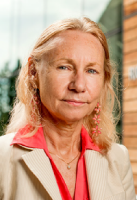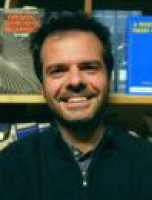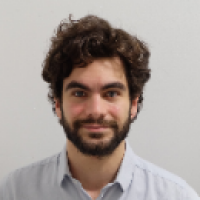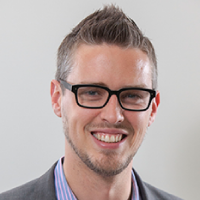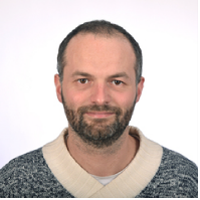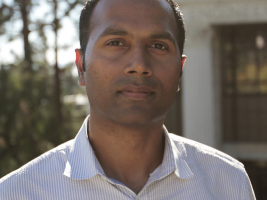|
|
|
Keynote talksAlice M. Agogino, UC Berkeley, USA
Tentative Title: Multi-Cable Rolling Locomotion with Compliant Parallel Tensegrity Robots Bio-sketch: Alice M. Agogino is the Roscoe and Elizabeth Hughes Professor of Mechanical Engineering at the University of California at Berkeley where she serves as Chair of the Graduate Group in Development Engineering and Education Director of the Blum Center for Developing Economies. She directs research in the BEST (Berkeley Emergent Space Tensegrities) Lab. Agogino has authored over 300 peer-reviewed publications, is a member of the National Academy of Engineering (NAE) and has served on a number of committees of the National Academies. She conducts research in robotics, sensor fusion, artificial intelligence, machine learning and product design. Agogino has won numerous teaching, research, outreach and mentoring awards, recently the Athena Award for Academic Leadership (2020), the Presidential Award for Excellence in Science, Mathematics and Engineering Mentoring (2018) and ASME Design Theory and Methodology Award (2017). She has supervised 61 PhD dissertations and 196 MS theses/reports. Agogino is also co-founder and CEO of Squishy Robotics, a start-up that provides life-saving, cost-saving information in real time through its rapidly deployable sensor robots. Applications include disaster response, methane and wildfire monitoring, Industrial Internet of things (IIoT), and space exploration. Squishy Robotics was among the recipients of the inaugural “Good Robot” Industry Awards presented by the non-profit industry association, Silicon Valley Robotics (SVR). The SVR Industry Awards celebrate the robotics, automation, and Artificial Intelligence (AI) that will help the world solve global challenges. Squishy Robotics was also a finalist in the 2021 Extreme Tech challenge, which highlighted companies with innovations that address the greatest crises facing humanity and our planet.
Marco Carricato and Edoardo Idà, Bologna University, Italy
Tentative title: Underactuated Cable-Driven Parallel Robots: opportunities and challenges Bio-sketches of M. Carricato: Marco Carricato received the M.Sc. degree (with honors) in Mechanical Engineering in 1998, and the Ph.D. degree in Mechanics of Machines in 2002. He has been with the University of Bologna since 2004. He is currently a Full Professor in the Department of Industrial Engineering, where he is the head of the IRMA L@B (Industrial Robotics, Mechatronics & Automation Lab @ Bologna). He is the Coordinator of the Ph.D. Degree in Mechanics and Advanced Engineering Sciences at the University of Bologna. He was visiting researcher at the Center for Intelligent Machines and Robotics of the University of Florida, USA, in 1998; at the Robotics Laboratory of the Laval University, Canada, in 2007; at the Dept. of Mechanical Engineering of the University of Guanajuato, México, in 2008; at the French National Institute for Research in Computer Science and Control, Sophia Antipolis, France, in 2009; at the École Centrale of Nantes, France, and at the Hong Kong University of Science and Technology, China, in 2013. He is an associate editor of the journal Mechanism and Machine Theory. He was awarded the AIMETA Junior Prize 2011 by the Italian Association of Theoretical and Applied Mechanics for outstanding research results in the field of Mechanics of Machines. His research interests include robotic systems, servo-actuated automatic machinery and the theory of mechanisms, with a particular emphasis on parallel manipulators (displacement analysis, kinematics, dynamics, synthesis, gravity compensation, cable drives), mobile collaborative robotics, efficiency and optimization of servomechanisms, and the theory of 'screws'. His work in the aforementioned areas has been the subject of a number of scientific publications in international conferences and journals. Bio-sketches of E. Idà: Edoardo Idà (Member, IEEE) received the M.Sc. degree (Hons.) in Mechanical Engineering from the University of Bologna in 2017, and the Ph.D. degree (Hons.) in Mechanics and Advanced Engineering Sciences, in 2021, from the same institution. He is currently a Post-Doc researcher at the University of Bologna, where he is a member of the IRMA L@B (Industrial Robotics, Mechatronics & Automation Lab @ Bologna). His research interests include cable-driven robotic systems and continuum parallel robots. He was awarded the best research paper at the Fifth International Conference on Cable-Driven Parallel Robots in 2021.
Aaron Dollar, Yale University, USA
Tentative title: Parallel Mechanism Architectures Facilitate Dexterous Within-Hand Manipulation Bio-sketch: Aaron Dollar is a Professor of Mechanical Engineering & Materials Science and Computer Science at Yale University, where he has been on faculty since 2009. He earned a B.S. in Mechanical Engineering at the University of Massachusetts at Amherst, S.M. and Ph.D. degrees in Engineering Sciences at Harvard, and conducted two years of Postdoctoral research at the MIT Media Lab. Professor Dollar directs the Yale GRAB Lab, with research primarily focused on human and robotic grasping and dexterous manipulation, mechanisms and machine design, and upper-limb prosthetics. He has received a number of best paper and other prestigious awards, including junior faculty awards from NASA, DARPA, AFOSR, and NSF. His service to the Robotics research community includes the YCB benchmarking initiatives, the Yale OpenHand Project, OpenRobotHardware.org, RoboticsCourseware.org, and founding the IEEE RAS TC on Robotic Mechanisms and Design. His work on robotic grasping and manipulation focuses primarily on the mechanics of the problem, including contacts, passive and active degrees of freedom, and other constraints, and how proper focus on those, combined with clever mechanical design can facilitate excellent performance with even minimal sensing and control.
Christian Duriez, INRIA, France
Tentative title: Modeling and control of continuum and soft parallel robots Bio-sketch: Christian Duriez is Research Director at Inria Lille - Nord Europe. He received a PhD degree in robotics from University of Evry and CEA in France in 2004 followed by a postdoctoral position at the CIMIT SimGroup in Boston. He arrived at INRIA in 2006 and worked on interactive simulation of deformable objects and haptic rendering with focus on surgical simulation. He was promoted Directeur de Recherche in 2014 and is now the head of DEFROST team, created in January 2015. In 2018 he was invited researcher at Stanford University. His research topics are Soft Robot models and control, Fast Finite Element Methods, simulation of contact response, new algorithms for haptics... He participated to the creation of the open-source SOFA framework. He was also one of the founders of the start-up company InSimo.
Clément Gosselin, Laval University, Canada
Tentative title: Parallel robots, a historical perspective: from tyre testing to physical human-robot interaction Bio-sketch: Clément Gosselin received the B. Eng. degree in Mechanical Engineering from the Université de Sherbrooke, Québec, Canada, in 1985, and the Ph.D. degree from McGill University, Montréal, Québec, Canada in 1988. He was then a post-doctoral fellow at INRIA in Sophia-Antipolis, France in 1988–89. In 1989 he was appointed by the Department of Mechanical Engineering at Université Laval, Québec where he is a Full Professor since 1997. He is currently holding a Canada Research Chair in Robotics and Mechatronics since January 2001. He was a visiting researcher at the RWTH in Aachen, Germany in 1995, at the University of Victoria, Canada in 1996 and at the IRCCyN in Nantes, France in 1999. His research interests are kinematics, dynamics and control of robotic mechanical systems with a particular emphasis on the mechanics of grasping, the kinematics and dynamics of parallel manipulators and the development of human-friendly robots and haptic devices. His work in the aforementioned areas has been the subject of numerous publications in international journals and conferences as well as of several patents and two books. He has been directing many research initiatives, including collaborations with several Canadian and foreign high-technology companies and he has trained more than 120 graduate students. He is currently an Associate Editor of the ASME Journal of Mechanisms and Robotics. Dr. Gosselin received several awards including the ASME DED Mechanisms and Robotics Committee Award in 2008, the ASME Machine Design Award in 2013 and the IFToMM Award of Merit in 2019. He was appointed Officer of the Order of Canada in 2010 for contributions to research in parallel mechanisms and underactuated systems. He is a fellow of the ASME, of the IEEE and of the Royal Society of Canada.
Koushil Sreenath, UC Berkeley, USA
Tentative title: Dynamic and Collaborative Aerial Manipulation Bio-sketch: Koushil Sreenath is an Assistant Professor of Mechanical Engineering, at UC Berkeley. He received a Ph.D. degree in Electrical Engineering and Computer Science and a M.S. degree in Applied Mathematics from the University of Michigan at Ann Arbor, MI, in 2011. He was a Postdoctoral Scholar at the GRASP Lab at University of Pennsylvania from 2011 to 2013 and an Assistant Professor at Carnegie Mellon University from 2013 to 2017. His research interest lies at the intersection of highly dynamic robotics and applied nonlinear control. His work on dynamic legged locomotion was featured on The Discovery Channel, CNN, ESPN, FOX, and CBS. His work on dynamic aerial manipulation was featured on the IEEE Spectrum, New Scientist, and Huffington Post. His work on adaptive sampling with mobile sensor networks was published as a book. He received the NSF CAREER, Hellman Fellow, Best Paper Award at the Robotics: Science and Systems (RSS), and the Google Faculty Research Award in Robotics.
|
| Online user: 6 | Privacy | Accessibility |

|

